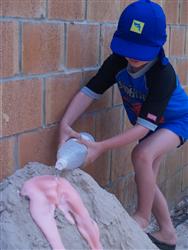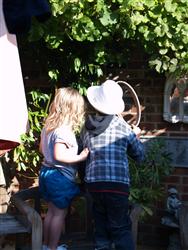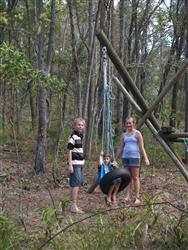Learn about How People Develop Over Their Lifetime
Developmental psychology is concerned with psychological needs and stages of development across the lifespan. There are a number of different stage theories and each attempts to explain how we transition from one stage to the next. However, moving to the next stage is not always smooth. Sometimes we seem to get stuck for a while, or development slows. We may even appear to regress for a while.
Study this course to improve your understanding of different stages of cognitive, moral and social development from early childhood through to late adulthood. Find out what the main theories have to say about what to expect from life. Learn about key processes at different stages of life and what happens as we move from childhood to old age.
Duration: 100 hours
The Lessons:
The course is divided into ten lessons as follows:
 1. Introduction - Theoretical approaches and key concepts Lifelong growth, nature/nurture; theories – psychodynamic, behavioural, social cognitive, cognitive, lifespan;
1. Introduction - Theoretical approaches and key concepts Lifelong growth, nature/nurture; theories – psychodynamic, behavioural, social cognitive, cognitive, lifespan;
2. Early childhood – cognitive & social development in the first 6 years Genetics, personality, cognition, recognition, memory, social relationships;
3. Middle childhood – cognitive, moral & social development in the school years Motor skills, cognitive and language development, relationships with family and peers, moral development;
4. Challenges of middle childhood School and learning, sense of self, achievement, peer pressure, family breakup, grief and trauma;
5. Adolescence – cognitive, moral and social development Cognitive development, moral development, identity, relationships with family and peers;
6. Challenges of adolescence Sexuality, peer groups, identity vs role confusion, trauma, depression, values and meaning;
7. Adulthood – cognitive and psychosocial development in early and middle adulthood Sexuality, parenthood. work and achievement, moral reasoning, gender roles, cultural perspectives, adult thinking;
8. Challenges of adulthood Marriage and divorce, grief, depression, parenting, dealing with change;
9. Late adulthood – cognitive and psychosocial changes in the elderly Intelligence, learning and age, physiological influences, cognitive abilities, personality changes, relationships;
10. Challenges of late adulthood Loss, mourning, depression and elderly suicide, aging brain – dementia etc, integrity vs despair, loss of independence.
COURSE AIMS
 Learn key theories and concepts in the study of developmental psychology;
List major ethical concerns when studying development, and one step a researcher can take to reduce each;
Identify cognitive and social aspects of a small child’s development and some key inherent and external influences;
Describe the phases of language acquisition in infants, and what can adversely affect it;
Describe major cognitive, moral and social developments in middle childhood and how they influence behaviour
Compare short term memory with long term memory in middle childhood, and discuss how this affects the child’s ability to learn;
Identify common psychological challenges faced by children from ages 6 to puberty;
Reflect on your own success and failure experiences, and your own sense of competence in middle childhood. Consider how they affected your perceptions of yourself as you matured;
Identify areas of change that will affect adolescent behaviour and thinking;
Explain post formal thought, and consider how it can contribute to an adolescent’s ability or willingness to make moral choices;
Identify challenges common to adolescence, and ways to deal with them;
Explain individuation. Discuss its importance, and how it can both challenge and complement group identity;
Identify changes that can occur in early and middle adulthood and influence behaviour;
Explain K. Warner Schaie’s ‘stages of adult thinking’ and explain why Schaie’s model might be more relevant to understanding adult cognition than Piaget’s cognitive model;
Identify some key challenges faced in adulthood and ways of coping with them;
List some changes that are typically associated with ‘midlife crisis’. Discuss both negative and positive aspects of ‘midlife crisis’;
Identify effects of physiological changes and life experience on the aged person’s cognitive and psychosocial experiences;
Explain how ‘cognitive plasticity’ can affect an older person’s ability to learn despite brain cell loss;
Research depression and suicide among the elderly;
Research ways that an older person can be made to feel more independent and autonomous. Consider in your response what family members can do to respect the older person’s need for autonomy.
Learn key theories and concepts in the study of developmental psychology;
List major ethical concerns when studying development, and one step a researcher can take to reduce each;
Identify cognitive and social aspects of a small child’s development and some key inherent and external influences;
Describe the phases of language acquisition in infants, and what can adversely affect it;
Describe major cognitive, moral and social developments in middle childhood and how they influence behaviour
Compare short term memory with long term memory in middle childhood, and discuss how this affects the child’s ability to learn;
Identify common psychological challenges faced by children from ages 6 to puberty;
Reflect on your own success and failure experiences, and your own sense of competence in middle childhood. Consider how they affected your perceptions of yourself as you matured;
Identify areas of change that will affect adolescent behaviour and thinking;
Explain post formal thought, and consider how it can contribute to an adolescent’s ability or willingness to make moral choices;
Identify challenges common to adolescence, and ways to deal with them;
Explain individuation. Discuss its importance, and how it can both challenge and complement group identity;
Identify changes that can occur in early and middle adulthood and influence behaviour;
Explain K. Warner Schaie’s ‘stages of adult thinking’ and explain why Schaie’s model might be more relevant to understanding adult cognition than Piaget’s cognitive model;
Identify some key challenges faced in adulthood and ways of coping with them;
List some changes that are typically associated with ‘midlife crisis’. Discuss both negative and positive aspects of ‘midlife crisis’;
Identify effects of physiological changes and life experience on the aged person’s cognitive and psychosocial experiences;
Explain how ‘cognitive plasticity’ can affect an older person’s ability to learn despite brain cell loss;
Research depression and suicide among the elderly;
Research ways that an older person can be made to feel more independent and autonomous. Consider in your response what family members can do to respect the older person’s need for autonomy.
Some Sample Course Notes -
 NATURE/NURTURE
NATURE/NURTURE
Is development determined by nature or nurture? This question has been under much debate since before psychology emerged as a science. Although today, most developmental psychologists agree that development is a result of both nature AND nurture, the relative strength of influence from each is still under scrutiny.
In the early twentieth century there was much debate about how much of our behaviour was due to nature (genetic maturation) and how much was due to nurture (learning). We now know that these two influences interact to produce different behaviours, attitudes, and personalities. Nevertheless, the debate continues to be vigorous.
In the 1950’s, Noam Chomsky challenged the dominant theory of language acquisition at the time, that all aspects of language are learned, mostly by imitation. According to Chomsky and other theorists, humans are born with a natural, inherent capacity and tendency to create language. This nativist theory of language (as opposed to B.F. Skinner’s learning theory of language) posits that humans are genetically equipped with an innate process for learning language, much as birds are genetically equipped for flight. This and similar theories of language are partly supported by the fact that children all over the world develop language in very similar ways, by learning the fundamental rules of their native language. Research has shown that they can do this regardless of environmental factors, unless those factors are extreme. Even fairly isolated children, given a minimum of interaction with others, learn the rudiments of language, though not as well, of course, as in a stimulating environment.
Interactionist theories of language acquisition have tried to resolve the problems with nativist and learning theories. These propose that while children do have an inherent pre-disposition to form and learn language, experience and a supportive learning environment are also needed for language to develop.
With so many research projects being held on development, there are some ethical constraints on studying development. These are concerns about the methods that researches use as well as the ethical issues of confidentiality, full disclosure of purposes, and the respect for individuals’ freedom to participate. Most research done today, take these three issues in to account.
Learning experiences that occur over a lifetime are the source of developmental change. Changes in existing learning opportunities or the creation of new ones can modify the course of an individual’s developmental psychology. Direct learning results when a person actively responds to and interprets new problems and experiences based on patterns of thought and action he already knows.
These existing patterns are called a scheme which is a systematic pattern of thoughts, actions, and problem-solving strategies that helps the individual deal with a particular situation. Simply said, how we handle things in relation to what we have already experienced. As an infant, we don’t have much prior experiences but this rapidly changes the infant encounter new experiences through the complementary process of assimilation and accommodation.
MORE COURSES
Interested in working with children, why not have a look at these courses?
Adolescent Psychology
http://www.acseduonline.com/courses/product.aspx?id=349
Child Psychology
http://www.acseduonline.com/courses/product.aspx?id=146
If you are not sure about this course, why not have a look at our Introduction to Psychology course
http://www.acseduonline.com/courses/product.aspx?id=139
If you would like to see our range of psychology books, please visit - http://www.acsbookshop.com/books_productcategory.aspx?id=14
For more information on the range of careers available in psychology, have a look at - http://www.thecareersguide.com/articles.aspx?category=14
We have some interesting articles on psychology and counseling at - http://www.acs.edu.au/psychol/
If you would rather do a course via correspondence, you can visit www.acs.edu.au or www.acsedu.co.uk and find a wide range of courses.
Why Study with Us
· International Recognition
· Highly qualified tutors
· Ethical and Green
· More choice and Flexibility
· Unlimited one on one access to tutors
· More focus on learning, less on Assessment
· Outstanding track record - graduates actually succeed!
Who Is This Course For?
This course is aimed at students of psychology and counselling but is also a valuable learning experience for those in related fields such as caring roles or helping roles.
It may also be useful for youth workers, child minders, teachers and others who work with children.
Study this course either by itself or as part of a self-designed certificate or higher qualification to enhance your current skills or as a foundation towards further study.
MEET OUR FACULTY
These are some of the people who may support you as tutors, mentors and advisors as you study this course.
|
|
|
|
John L. Mason Dip.Hort.Sc., Sup'n Cert., FIOH, FPLA, MAIH, MACHPER, MASA
Former Director of Recreation and Parks with Essendon City Council, Consultant with the Playgrounds and Recreation Association of Victoria, principal of ACS Distance Education since 1979, author of over 70 books including The Environment of Play, Aerobic Fitness, and a range of titles covering small business, management, writing, agriculture, horticulture and fitness.
|
Tracey Jones - Academic Officer & Tutor (U.K.)
B.Sc. (Hons) (Psychology), M.Soc.Sc (social work), DipSW (social work), PGCE (Education), PGD (Learning Disability Studies)
Tracey has around 25 years experience within the psychology and social work field, particularly working with people with learning disabilities. She is an author of several psychology texts and a book reviewer for the British Journal of Social Work. |
Lyn Quirk M.Prof.Ed.; Adv.Dip.Compl.Med (Naturopathy); Adv.Dip.Sports Therapy
Lyn has 35 years of experience in the Fitness, Health and Leisure Industries. She has a string of qualifications that are far too long to list here; being qualified and registered to teach, coach or instruct a wide range of different sports and other skills. Lyn established and managed Health clubs at three major five star resorts on Australia's Gold Coast, including The Marriot. She was a department head for a large government vocational college (TAFE), and has conducted her own aquafitness business for many years. Lyn has amongst her other commitments worked as a tutor for ACS for almost 20 years, and over that time, participated in the development or upgrading of many courses. |
 |
 |
 |
Adriana Fraser Cert.Child Care, Adv.Cert.App.Mgt., Adv.Dip.Hort.
30 years of experience in education, business, journalism and horticulture.
Adriana has written regularly for a range of publications (including Australia's national Grass Roots Magazine) since the early 1980's, and contributed to dozens of books, and authored others. She is an experienced careers counsellor and educator with a diverse background and a unique understanding of educational psychology. |
Miriam ter Borg B.Sc. (Psychology), DipRem.Massage, Cert Ourdoor Rec.
Miriam has worked for over ten years in youth work, welfare, leisure services and education; both in New Zealand and Australia. She is a contributor to several text books and an experienced careers counsellor.
In addition she is a qualified and experienced massage therapist. |
Gavin Cole B.Sc., Cert.Garden Design, MACA
Gavin has three decades of industry experience in Landscaping, Publishing and both the UK and Australia, across landscaping and the amenity plant sector. He was operations manager for a highly reputable British Landscape firm (The Chelsea Gardener) before starting up his own firm. He spent the best part of three years working in our Gold Coast office. |